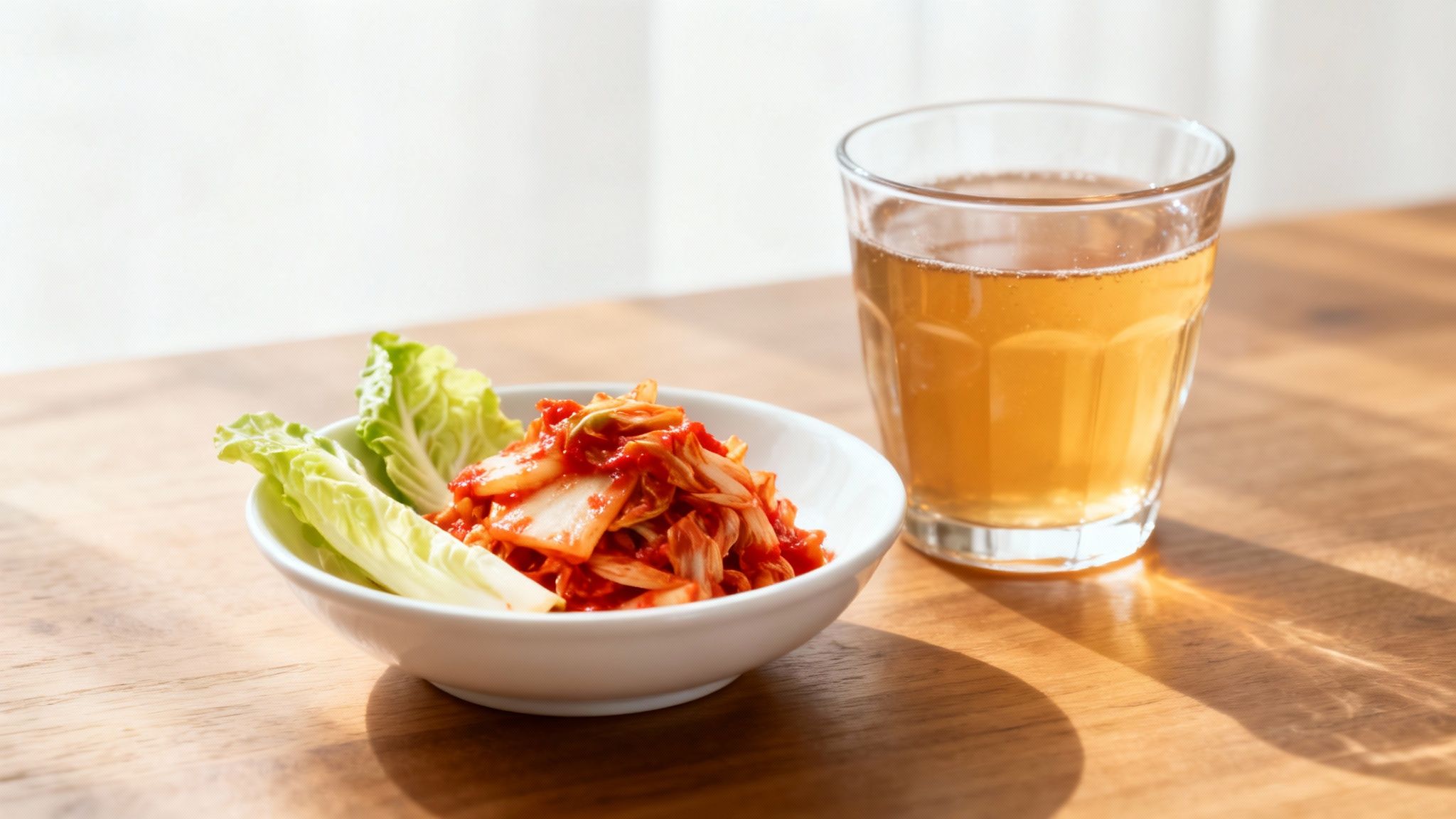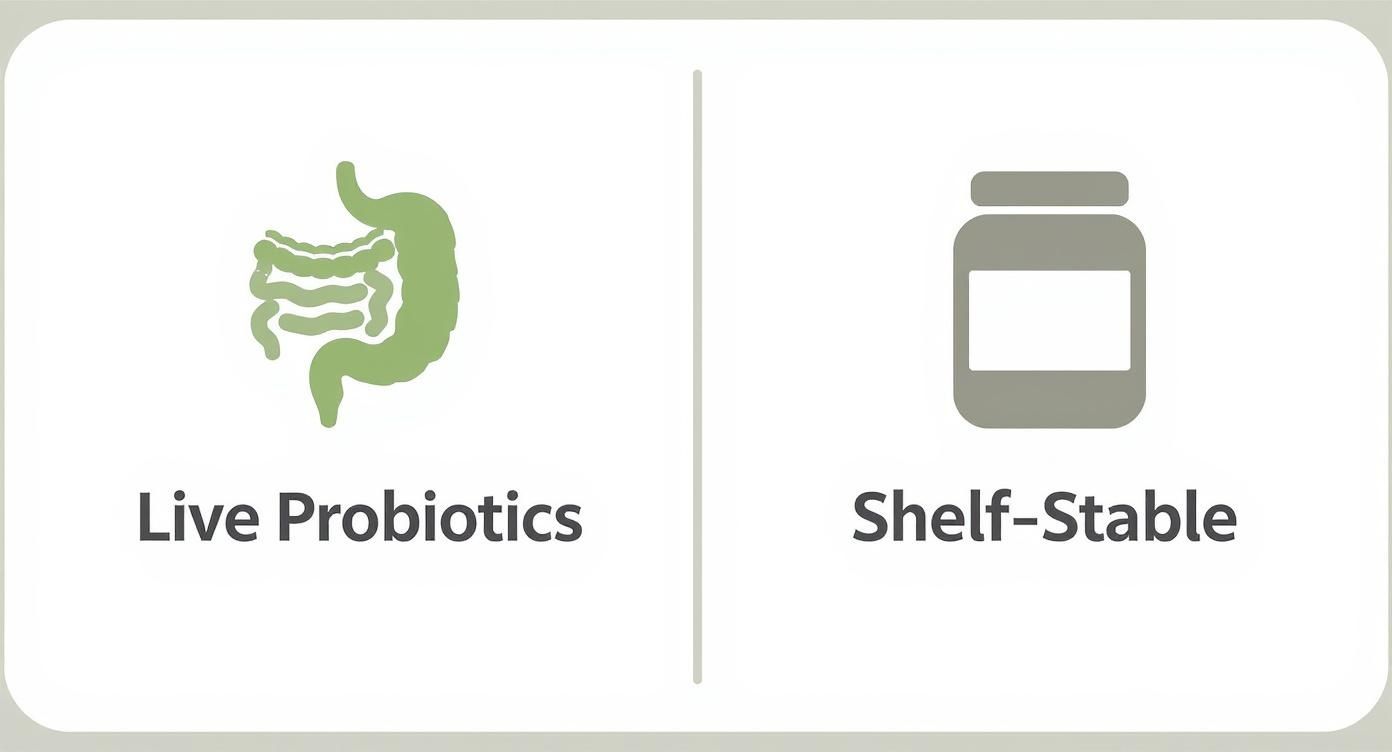Fermented Foods for Digestion and a Happier Gut
Ever feel like your stomach inflates like a balloon by afternoon? You’re not alone- and it’s not just what you ate. That frustrating, uncomfortable feeling of being bloated and gassy is something so many of us struggle with. But what if the answer wasn't about cutting things out, but about adding something powerful in?
For centuries, cultures across the globe have used fermentation not just to preserve food, but to boost their health. This guide is your friendly roadmap to using these amazing foods to calm your stomach for good. We'll show you exactly how fermented foods for digestion work, which ones pack the biggest punch, and how to make them a simple, natural part of your life. Let's get you feeling great from the inside out.
Why Your Gut Loves Fermented Foods
So, what’s the big deal with these foods? Why do we hear so much about them? It’s a fascinating process where tiny microorganisms like bacteria and yeast break down carbs, creating beneficial acids and enzymes that essentially pre-digest the food for you. Imagine giving your internal ecosystem the all-star support crew it’s been missing.
Think of your gut microbiome as a bustling, vibrant garden. For that garden to flourish, you need plenty of "good gardeners"- the beneficial microbes- to tend the soil and keep the weeds from taking over. Fermented foods are packed with probiotics, which are essentially those helpful gardeners. When you eat them, you're sending reinforcements straight to your gut.
Here’s a look at what you stand to gain:
- A Surge of Good Bacteria: Fermented foods are a fantastic source of probiotics, the friendly microbes that help keep your gut microbiome in healthy equilibrium.
- Better Nutrient Absorption: The fermentation process breaks down tough compounds in food, making it far easier for you to absorb all the vitamins and minerals. You can dive deeper into these time-tested benefits with insights from health experts at Cedars-Sinai.
- Less Bloating and Gas: By making your digestion more efficient, these foods can seriously reduce that uncomfortable gas and bloating that can ruin your day.

Good Bacteria vs. Bad Bacteria: It’s All About Balance
A well-tended gut garden is diverse and strong. Regularly eating fermented foods can significantly shift your gut’s microbial populations for the better. This means you're actively creating a healthier internal ecosystem with every bite. The benefits don't stop at digestion, either. A balanced gut can even influence other surprising areas of your health, like the surprising link between probiotics and sugar cravings.
The Crucial Difference: Raw vs. Pasteurized
Now, this is a really important point that I do NOT want you to miss. Not all fermented foods are created equal. The absolute key is whether the food contains live and active cultures.
The magic is in the microbes! To get the real digestive benefits, you need to choose products where the good bacteria are still alive and kicking.
Many fermented products on grocery store shelves have been pasteurized. This heating process extends shelf life, but it kills off all the bacteria- the good guys included.
To make sure you're getting the real deal, always check the label. Look for words like "raw," "unpasteurized," or "contains live and active cultures." These gems are almost always in the refrigerated section of the store.
For a deeper dive into building a resilient digestive system from the ground up, check out our complete guide on how to improve gut health.
The Top 5 Fermented Foods for Your Digestive System
Ready to start adding these gut-friendly superstars to your plate? The world of fermented foods can seem intimidating, but it doesn't have to be. We’ve put together a simple list of our top five favorites to support your digestion and help you feel your best.
These are the tried-and-true powerhouses that are not only effective but also easy to find and work into meals you already love. Let's dive in!
1. Yogurt and Kefir
You're probably familiar with yogurt, but have you met its cousin, kefir? Think of it as a drinkable, fermented yogurt that often packs an even bigger probiotic punch. Kefir can contain a wider variety of beneficial bacteria and yeasts, making it a true digestive champion.
- How to use it: Add plain, unsweetened kefir or yogurt to your morning smoothie or use it as a creamy base for salad dressings.
- What to look for: Always choose brands that explicitly state "live and active cultures" on the label.
2. Sauerkraut
This classic fermented cabbage is a gut-health giant. It’s loaded with probiotics, fiber, and enzymes that make digestion smoother. But here's the crucial tip: not all sauerkraut is created equal.
- How to use it: Add a spoonful to your salads, pile it onto a sandwich, or serve it as a zesty side dish.
- What to look for: You MUST buy it from the refrigerated section. Those shelf-stable jars have been pasteurized, a process that kills off all the beneficial bacteria.

3. Kimchi
If you like a little spice, kimchi is for you! This traditional Korean side dish is made from fermented vegetables- usually napa cabbage and radishes- with a flavorful kick from garlic, ginger, and chili.
- How to use it: Mix it into fried rice, toss it in with scrambled eggs, or use it as a bold topping for tacos and grain bowls.
- What to look for: Just like sauerkraut, you’ll find the good stuff in the refrigerated aisle, where it's teeming with live probiotics.
4. Kombucha
Kombucha is a bubbly, fermented tea that has become incredibly popular. It’s a refreshing way to get a solid dose of probiotics and beneficial acids that can support your gut.
- How to use it: It’s a fantastic, healthy alternative to soda when that 3 p.m. craving hits.
- What to look for: Check the sugar content! Some brands are basically soda in disguise. We recommend opting for those with 5 grams of sugar or less per serving.
5. Miso
A staple in Japanese cuisine, miso is a fermented soybean paste that brings a rich, savory "umami" flavor to dishes. It's a brilliant way to add depth to your cooking while also supporting your gut.
- How to use it: Whisk it into warm water for a simple soup, add it to marinades for fish or tofu, or blend it into salad dressings.
- What to look for: For the highest probiotic content, look for unpasteurized miso in the refrigerated section.
Science Corner: How a Diverse Gut Calms Inflammation
It’s one thing to hear that fermented foods are good for you, but it’s another to see the science that backs it up. The good news? The evidence is powerful.
Think of your gut again like that garden. A garden with tons of different plants is far more resilient than a field with just one crop. The more variety of good bacteria you have- what experts call microbiome diversity- the stronger your digestive system becomes. This diversity helps keep "bad" bacteria in check, strengthens your gut lining, and ensures you're absorbing nutrients. It’s your frontline defense against digestive chaos.
But the benefits don't stop there. This microbial diversity has a profound, calming effect on your entire body, especially when it comes to inflammation.
A landmark clinical trial from the Stanford School of Medicine discovered that a diet rich in fermented foods for digestion significantly increased gut microbiome diversity and lowered the levels of 19 different inflammatory proteins in the body. You can read the full study from Stanford Medicine to see just how impactful this is.
What this means for you: Eating foods like kimchi and kefir doesn't just help with bloating; it actively helps calm your body's inflammatory responses. By adding these foods to your diet, you're not just patching up symptoms- you're building a foundation for real, lasting wellness.
From Founder's Struggle to Your Solution
For us, this isn't just about the science- it's personal. Our founder, Sam, spent years grappling with the kind of digestive issues so many of us know all too well. That constant, frustrating bloat and discomfort after almost every meal was his reality. It got to the point where he felt like he had to sideline his favorite foods just to feel normal.
His search for a real solution led him to the incredible world of fermented foods for digestion. He quickly learned that a slow, steady approach was key.

The real breakthrough came when Sam paired his new food-first strategy with smart, targeted support. While fermented foods were rebuilding his gut health for the long haul, he still needed immediate help with trickier meals. That realization was the spark for Yuve's digestive support.
This personal journey is the foundation of everything we do. We get the struggle, and we know from experience that feeling great is truly possible.
Sam's Key Takeaway: "I learned that long-term gut health and immediate digestive relief work hand-in-hand. Fermented foods rebuilt my gut's foundation, but having the right support for tricky meals was the missing piece that gave me my life back."
Quick Wins: Your Action Plan for Better Digestion
Feeling inspired? Let's turn that feeling into a simple, practical game plan. You don't need to flip your entire life upside down; the best changes come from small, consistent habits. Here’s your no-stress checklist.
1. Start Slow and Steady
When you're bringing new fermented foods into your diet, the golden rule is to start with just one small serving a day. A gentle start is key.
- Try a spoonful of sauerkraut on the side of your dinner.
- Blend a small glass of kefir into your morning smoothie.
- Add a forkful of kimchi to your scrambled eggs.
After a week, if everything feels good, you can slowly increase how much you eat. Remember, consistency over quantity is the goal.
2. Pair Food with Smart Support
Building a resilient gut with whole foods is the best long-term strategy. But let's be realistic- some meals are just tough on digestion. This is where a targeted supplement can be your secret weapon.
Taking Yuve Papaya Enzymes just before a meal provides the extra digestive firepower needed to break down proteins, fats, and carbs more efficiently. Think of it as calling in the expert cleanup crew before the party gets messy. It partners with your body to help prevent uncomfortable bloating before it starts, letting you enjoy the foods you love.
This approach perfectly complements your new food-first habit. For a deeper dive into building your meals for digestive harmony, take a look at our complete gut health diet plan.
Ready to give your digestion the support it deserves? Try Yuve Papaya Enzymes today and feel the difference for yourself.
FAQ: Your Fermented Foods Questions Answered
It's completely natural to have a few questions. Let's walk through some of the most common ones we hear about fermented foods for digestion. Our goal is to help you feel totally confident.
Can I eat too many fermented foods?
Yes, you can have too much of a good thing, especially at first. Jumping in with several servings a day can be a shock to your system. The best strategy is to start slow. A single spoonful of kimchi or a small glass of kefir is plenty. This gives your gut a chance to adjust.
Don't all yogurts have probiotics?
Great question! Surprisingly, no. Many commercial brands are pasteurized (heat-treated) after fermentation, which kills the live bacteria. To make sure you're getting the real deal, always look for the phrase "live and active cultures" on the label.
What if I don't like kimchi or sauerkraut?
No problem at all! The world of fermented foods is vast. You have plenty of other delicious options to explore, like kefir, miso, or classic yogurt. You can also try mixing a tiny bit into a dish you already enjoy to get used to the new flavor.
Should I expect to be gassy at first?
It's possible, but don't panic- it's almost always temporary. A bit of initial gas can actually be a good sign! It means the new probiotics are doing their job and rebalancing your gut environment. By starting with small amounts, this adjustment phase usually passes in just a few days. For a deeper dive, check out our guide on the best probiotics for digestion.
